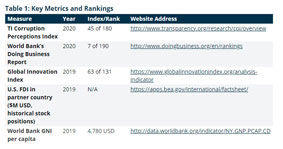
Georgia in US State Department 2021 Investment Climate Statements
By Natalia Kochiashvili
Friday, July 23
The US Department of State's Report on Investment Climate 2021, published this week, covered Georgia among many other countries. The report provides a detailed overview of Georgia's high ranking in various international organizations, the country's legislation, the state of the economy and financial sector, political situation, and security environment. The document reads that Georgia, located at the crossroads of Western Asia and Eastern Europe, is a small but open market that derives benefits from international trade, tourism, and transportation.
Despite being susceptible to global and regional shocks, the country's sweeping economic reforms since 1991 have produced a relatively well-functioning and stable market economy. The average growth rate was over 5% from 2005 through 2019, and rankings improved impressively in global business, governance, corruption, and other indexes: Georgia ranks 7 in the 2020 World Bank’s Ease of Doing Business index, 12 in the Heritage Foundations’ 2021 Economic Freedom Index, 8 in the Economic Freedom of the World of Frazer Institute, and 45th in Transparency International’s Corruption Perception Index.
The summary of the report also underlines that fiscal and monetary policies are focused on low deficits and inflation, and a floating real exchange rate, although the latter has been affected by regional developments, like sanctions on Russia, and a stronger dollar.
The pandemic reversed some of the past gains and placed significant pressure on the domestic currency and local economy. Georgia’s economy contracted 6% in 2020 with steep losses in tourism. According to the World Bank, Georgia “has a sound macroeconomic framework, attractive business environment, and robust public financial management arrangements that are expected to support the post-COVID recovery. Georgia’s governance indicators typically exceed Europe and Central Asia and upper-middle-income country averages.”
The Georgian Gov’t Program 2021-2024 Toward Building a European State, which outlines economic policy priorities for quick recovery, stresses the govt’s commitment to property rights protection and business-friendly policies, such as low taxes, pledges to invest in human capital, and to strive for inclusive growth. It emphasizes Georgia’s geographic potential as a trade and logistics hub along the New Silk Road linking Asia and Europe via the Caucasus.
Investment Climate Report 2021 names transit and logistics as priority sectors in Georgia since it seeks to benefit from increased East/West trade through the country. It addresses the Baku-Tbilisi-Kars railroad which has boosted Georgia’s transit prospects and the gov’t has looked for ways to enhance trade.
“Overall, business and investment conditions are sound. However, there is an increasing lack of confidence in the judicial sector’s ability to adjudicate commercial cases independently or in a timely, competent manner, with some business dispute cases languishing in the court system for years.” reads the report. Other companies complain of inefficient decision-making processes at the municipal level, shortcomings in the enforcement of intellectual property rights, lack of effective anti-trust policies, accusations of political meddling, selective enforcement of laws and regulations, including commercial laws, and difficulties resolving disputes over property rights. The document underlines that the Georgian gov’t continues its work to address these issues, and despite remaining challenges, the country ranks high in the region as a good place to do business.
The section on corruption reports that Georgia has succeeded in combating low-level corruption, although the issue of what Transparency International called "elite" corruption is still problematic when high-ranking officials use legal loopholes to enrich personal wealth, status, or accountability. Although the evidence is largely fragmented, this form of corruption or the perception that it exists can undermine public confidence in Georgian institutions and the investment environment.
Later on, the document focuses on the controversial issue of Anaklia port. According to the State Dept report, 4 years after the gov’t awarded the contract to build a new port in Anaklia to a group of international investors, including a U.S. company, it terminated its contract with the group for the development of a deep-sea port in 2020. “The investor group alleges gov’t actions against the project led to financial difficulties and eventual contract termination. Despite the govt’s claim that it remains committed to the construction of a deep-sea port in Anaklia, investors and local business leaders doubt that commitment.” The report also indicates that separately, logistics and port management companies in Poti and Batumi have started the development and expansion of both the Batumi and Poti Ports. In 2020, logistics companies will complete 2 new terminal projects and a 3rd will be underway – a multimodal terminal in Batumi and new terminals and increased storage in Poti, currently the largest port in Georgia with plans to increase deep-water capacity.
Besides this information, in its report State Dept informs that the U.S. and Georgia work to increase bilateral trade and investment through a High-Level Dialogue on Trade and Investment and through the U.S.-Georgia Strategic Partnership Commission’s Economic, Energy, and Trade Working Group. Both countries signed a Bilateral Investment Treaty back in 1994, and Georgia is eligible to export many products duty-free to the US under the Generalized System of Preferences program.
Importantly, the document addresses Georgia’s geopolitical situation and Russia’s occupation of the Georgian territories of Abkhazia and South Ossetia, areas over which the central gov’t of Tbilisi doesn’t have effective control.
“The US supports Georgia’s sovereignty and territorial integrity within its internationally recognized borders and does not recognize the Abkhazia and South Ossetia regions of Georgia as an independent. Tensions still exist both inside the occupied territories and near the administrative boundary lines, but other parts of Georgia are not directly affected.” the report read.


